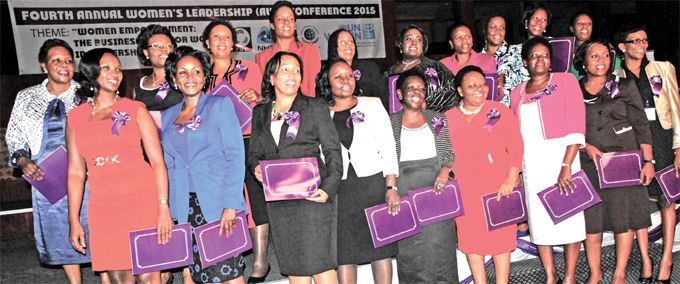Women's Day supplement: The time is now
Evolving roles, breaking boundaries
Activism now: The opportunities and challenges
By Gloria Nakajubi
The International Women's Day, as highlighted by the UN Women, is a time to reflect on the progress made, to call for change and to celebrate acts of courage and determination by ordinary women who have played an extraordinary role in the history of their countries and communities.
Under the theme Time is Now: Rural and urban activists transforming women's rights, the major focus of this year's celebrations is the role of activists in the women's movement. With a good number of women non-governmental organisations, under the umbrella body of Uganda Women's Network, the Uganda Women Parliamentary Association and a host other loose associations, Uganda is a hotbed of women activism spanning three decades.
 The last 30 years has seen women rise to big positions both in the public and private sectors
The last 30 years has seen women rise to big positions both in the public and private sectors
Aggressive, confrontational and unapologetic critics was the definition of activism decades ago. As Veronica Nakijoba, a lecturer at the School of Women and Gender Studies at Makerere University explains, that period was one of ‘fire'. So brunt that at one point, prominent activist Miria Matembe called for the castration of men who defile young girls. It was perceived as a battle between the male and females.
Much as it drew the attention of some, others decided to shun the movement branding it a ‘social rebellion'. Social rebellion it was according to the experts for the movement was meant to undo what is socially acceptable behaviour and yet infringes on the basic human rights of women.
However, as years go by, activism as argued by associate professor Consolata Kabonesa, a gender specialist, the playing field is changing and the same strategies that were deployed years ago may not necessarily apply, but rather ‘lessons to pick from'. "The new environment provides women with a diverse playing field. But also, it comes with an equal measure of challenges that require women to boldly take the step," Kabonesa says. CLICK HERE FOR MORE ON ON THIS STORY
How to scale up emancipation
The theme for this year's Women's Day is "Urban and rural activists transforming the lives of women". Stella Naigino sounded out a cross-section of elite women on how they can bring women on board and bridge gap between the urban and rural women. CLICK HERE FOR MORE ON THIS STORY
Are girls and women safe?
At least 23 women aged 18-35 years were murdered under mysterious circumstances between June and September of last year in Entebbe, Kitabi and Nasana in Wakiso district. The last victim was a 22-year-old waitress, Sarah Neliima, whose body was found on September 20, 2017.
Initially, Kale Kayihura, the former Inspector General of Police blamed the killings on domestic violence, unemployment and drug abuse. While the public was still trying to make sense of these claims, internal affairs minister Jeje Odongo added another twist to the puzzle.
He claimed the murders were linked to the devil worship and witch craft. These killings were executed in a similar manner which included attacking young women in the wee hours of the night, sexually assaulting them then strangling them to death before inserting sticks in their private parts.
The killings still remain unsolved and this has created fear among members of the public, especially women living in Entebbe and the surrounding areas with the bodies of three victims going unidentified.
In the same year, the country also unmasked renowned educationist, Lawrence Mukiibi Ssemakula the proprietor of the St. Lawrence schools and universities as a child abuser when some of his former students came out with children he fathered. CLICK HERE FOR MORE ON THIS STORY
ADVERTS
MINISTRY OF GENDER, LABOUR AND SOCIAL DEVELOPMENT